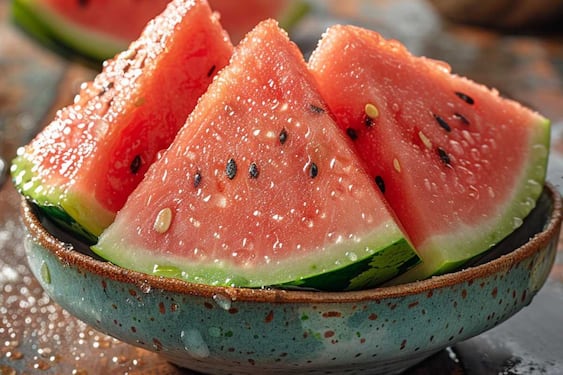Attention: 10 Situations When Watermelon Could Be Harmful
Watermelon is healthy but should be eaten in moderation in some cases. It can cause sleep disruption if eaten before bed and raise blood sugar levels for diabetics. People with kidney problems, hyperkalemia, or allergies should be cautious due to its potassium content and potential allergic reactions. Its sorbitol content may lead to digestive issues. Excessive consumption can interfere with weight loss and hydration balance.

While watermelon is refreshing and nutritious, it should be avoided in certain situations. Eating it before bedtime can cause frequent urination, disrupting sleep. Diabetics should consume it in moderation due to its high glycemic index. Those with kidney issues, hyperkalemia, or gastrointestinal problems should be cautious, as its potassium and sorbitol content can cause complications. Watermelon can also worsen cold symptoms and allergies in some individuals. Overeating it may hinder weight loss or cause overhydration when combined with other hydrating foods.
1. Before Bedtime:
Watermelon has a high water content, around 90%, which makes it a natural diuretic. Consuming it close to bedtime can increase the frequency of urination, disrupting your sleep. Additionally, the natural sugars in watermelon can cause a spike in energy, making it harder to fall asleep.
2. For Diabetics (in Excess):
While watermelon has a low-calorie content, it has a relatively high glycemic index (GI) of 72, which can cause a rapid spike in blood sugar levels. People with diabetes should consume watermelon in moderation, as large quantities can lead to imbalanced blood sugar control.
3. During Cold or Cough:
Since watermelon is a cooling fruit, consuming it when you have a cold or cough may exacerbate symptoms. It may lower the body's temperature, which can worsen a sore throat or cold by triggering more mucus production or aggravating respiratory issues.
4. For Those with Hyperkalemia:
Watermelon is a good source of potassium, but those suffering from hyperkalemia (high potassium levels in the blood) should be cautious. Consuming too much watermelon can worsen this condition, potentially leading to irregular heartbeats, kidney issues, or muscle weakness.
5. For People with Allergies:
Some individuals are allergic to watermelon due to a protein in it that resembles the pollen protein. People with Oral Allergy Syndrome (OAS) or those allergic to ragweed may experience symptoms like itching, swelling of the mouth, throat irritation, or even more severe reactions after consuming watermelon.
6. For Those with Gastrointestinal Issues:
Watermelon contains sorbitol, a sugar alcohol that can lead to bloating, gas, and diarrhea in sensitive individuals or those with irritable bowel syndrome (IBS). Excessive consumption may cause digestive discomfort or aggravate existing gastrointestinal problems.
7. In Combination with Other Hydrating Foods:
Watermelon's high water content, when eaten along with other hydrating foods such as cucumbers, cantaloupe, or coconut water, may lead to overhydration (also called hyperhydration or water intoxication). This condition can dilute the essential electrolytes in the body, leading to muscle cramps, weakness, or confusion.
8. After Large Meals:
Eating watermelon after a large or heavy meal can lead to digestive issues, as the high water and fiber content can cause the stomach to feel overly full. It may also slow down the digestion process and lead to discomfort or bloating due to fermentation of sugars in the fruit.
9. For People with Kidney Problems:
People with compromised kidney function may find it difficult to eliminate excess potassium, and watermelon is a moderately high-potassium fruit. In such cases, consuming too much watermelon can lead to potassium buildup in the blood, which can cause serious health issues like kidney failure or heart complications.
10. When Trying to Lose Weight (in Excess):
Though watermelon is low in calories, it is high in natural sugars. Overconsumption can contribute to excessive sugar intake, which could hinder weight loss efforts. Eating watermelon in moderation is key, as too much can also lead to water retention and bloating.
Summary:
While watermelon offers many health benefits, there are several situations when it should be avoided or eaten in moderation. These include nighttime consumption, for diabetics or those with kidney issues, gastrointestinal problems, or allergies. Additionally, those with hyperkalemia or trying to lose weight should be cautious, as should individuals consuming it with other hydrating foods or after heavy meals.
